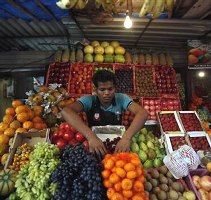The inflation trajectory is certainly very reassuring and points to lower interest rates, but the time for that is not yet at hand. 
Two factors have contributed to the recent improvement in India’s inflation scenario.
Domestically, the relatively under-performing monsoon, against widespread expectations, did not significantly impact the food-inflation trajectory.
Food inflation is still very much a problem and needs fixing urgently, but the bad monsoon apparently did not make it worse.
A key offsetting factor is the decision by the government to sell five million tonnes of rice and wheat every month from its very large stocks.
Rice prices, which had been rising at an average rate of over 15 per cent a year for almost the past two years, decelerated sharply in response to this.
This was an obvious short-term fix, particularly with the looming monsoon threat, and it seems to have worked.
Externally, again somewhat contrary to expectations, crude-oil prices have dropped sharply and, over the past few weeks, the benchmark Brent crude seems to have settled into a relatively stable range of around $95 a barrel, about 10 per cent below its previous and persistent range.
These developments would undoubtedly have increased expectations that the Reserve Bank of India would finally bring the interest rate down in its bi-monthly announcement next week.
In apparent anticipation of this, Governor Raghuram Rajan foreclosed on this option almost two weeks before the announcement. His reasons for playing his hand early were obvious; to prevent the spiralling of expectations, followed by expressions of disappointment and criticism against a cautious central bank.
But beyond the signalling motivation, there are some risks to the positive developments on the inflation front.
On the domestic side, the impact of the monsoon has not yet fully played out on food prices.
Over the past few weeks, the sale of stocks has indeed contained the pressure, but once the harvest begins to come in over the next few weeks, production could well be on the lower side, bringing inflationary pressure back.
Vegetables, in particular, have been a persistent problem, and their impact could intensify over the next couple of months.
On the oil front, geopolitical developments, including the re-entry of the United States in a combat role in West Asia, increase the risks of a price surge.
Assessing the balance between these risks is what the RBI is mandated to do.
If it believes that the upside risks to inflation are small, the policy implication would be that it can start reducing interest rates.
On the other hand, as the governor’s statement suggested, these risks are perceived to be significant, so the status quo must be maintained. Having sent a clear message about his priority on controlling inflation, Governor Rajan has much to lose and little to gain by cutting rates prematurely.
From the viewpoint of providing stimulus to growth, the benefits would be far greater if interest rates were brought down in a sustained way.
Based on the current risk assessment, that window is not yet at hand.
The likelihood of a quick reversal is significant, with the consequent damage to credibility, as well as investment activity.
In this situation, it is better to be safe than sorry.
The inflation trajectory is certainly very reassuring and points to lower interest rates, but the time for that is not yet at hand.






